Christian Foundation and Movement Relevancy

My Learnings at the 39th Advanced Studies Course by Eriko Yanagihara
Last Updated (Wednesday, 31 May 2023 10:48)
Motivations and Expectations for Participating in the ASC
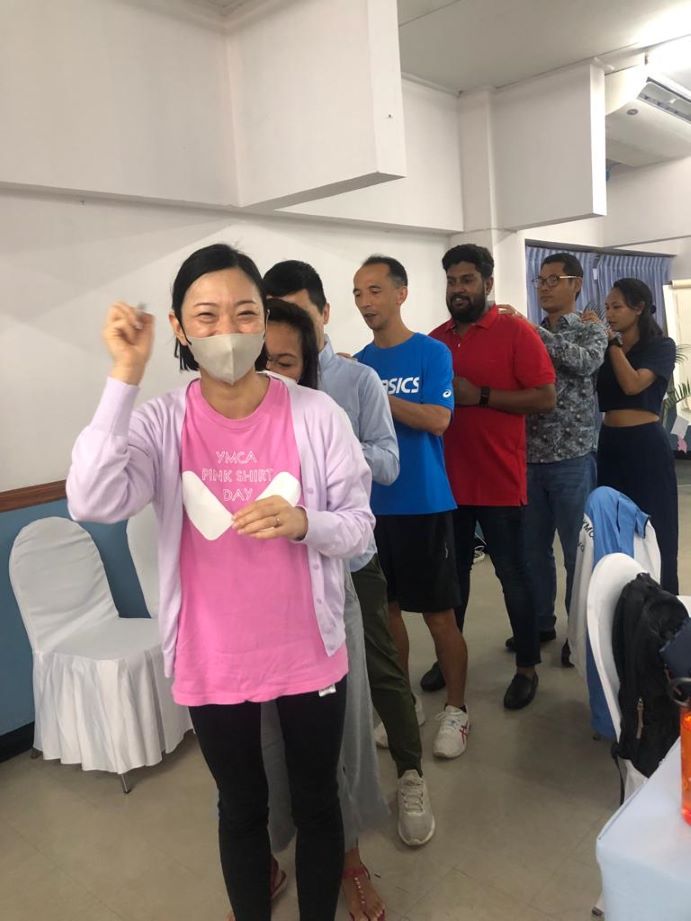 My motivation for participating in Advanced Study Course was that, as a staff of global and local community services, I wanted to promote the various activities of the Yokohama YMCA's projects in order to collaborate with the YMCA movement in the world, especially in the Asia-Pacific region, and to enhance the qualities (knowledge, skills, experience, and network) of the YMCA staff needed for this purpose.
My motivation for participating in Advanced Study Course was that, as a staff of global and local community services, I wanted to promote the various activities of the Yokohama YMCA's projects in order to collaborate with the YMCA movement in the world, especially in the Asia-Pacific region, and to enhance the qualities (knowledge, skills, experience, and network) of the YMCA staff needed for this purpose.
I also hoped to learn more about the social issues that arise due to the diversity and vulnerability of the Asia-Pacific region and to learn from the opinions of other participants on how YMCA can face and tackle these social issues.
A deeper understanding of our mission and Vision 2030 is essential for this. Through the ASC, I hoped to broaden my perspective and gain leadership skills to accept diverse values and advance the YMCA movement from new perspectives.
Building community
For the first, we started to know each other by sharing “Life Journeys.” It was a step forward in learning more about the people we will study with. It helped us to experience firsthand the diversity of each participant's background, relationship with the YMCA, and faith. It was also an excellent experience for the participants to take on roles such as daily worship, moderator, and documentation to manage the training schedule.
Since the YMCA is an ecumenical movement with diverse denominations of Christianity and non-Christians, we learned how to create worship that transcends differences in faith, brings us together, and unites our hearts through worship. I was used to the pattern of worship at the church I usually attend, but I learned that there is more than one way to create worship and that because the YMCA is an ecumenical organization, it is possible to develop worship in many different ways.
As the training progressed, through the lectures and discussions with participants from different countries, I gained a realistic sense of the diversity of the Asia-Pacific region. Despite the diversity and differences, all YMCAs share common challenges, and this was an opportunity to learn how to develop the YMCA movement in the diverse contexts of Asia.
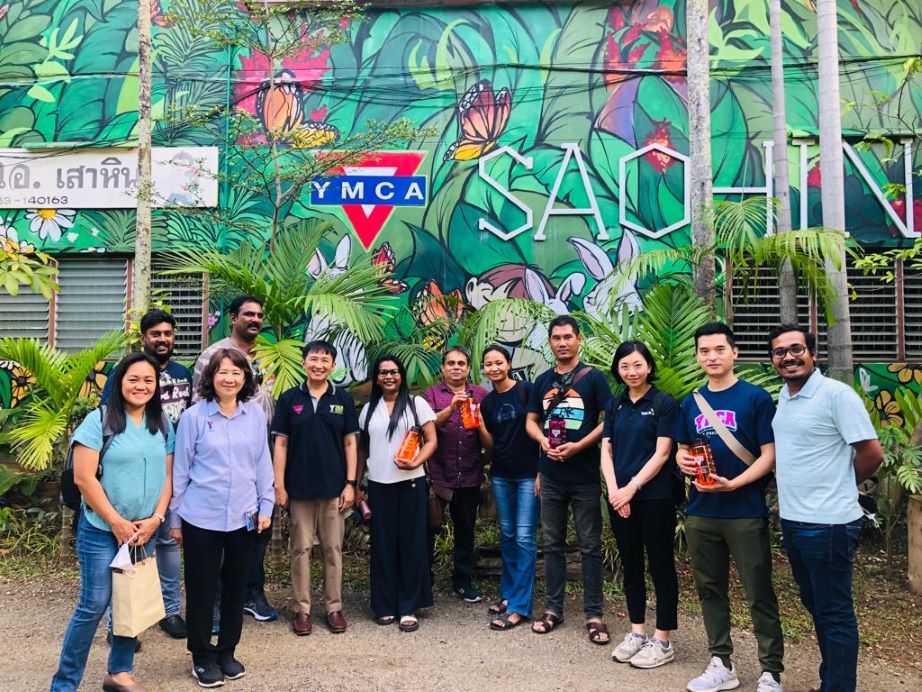
Contemporary Christian theological perspective & YMCA Mission
Learning about the mission initially was very important for the rest of the training because everything involved in the YMCA movement is based on the mission.
Mr. Nam boo won, General Secretary of APAY, pointed out that we should not try to understand the YMCA mission as it is but need to read it in each of our contexts, in the diversity of our contexts.
We also learned that the YMCA is not an issue-oriented organization that takes a holistic approach to society and people.
To strengthen our YMCA movement, it needs to be biblically faith-based and socially relevant.
We can learn our mission from the history of the YMCA, through Paris Basis, the Kampala Principles, and Challenge 21, and by understanding our context from a cultural, historical, political, and economic perspective about our region.
VISION 2030 and contemporary social realities & Alternative Responses
There were lectures such as; Gender Justice, Climate change, Interfaith Dialogue and Cooperation, and Peace Building & Conflict Resolution.
Each lecture was specific and practical and provided an opportunity to think about how to face these social issues in my community. It was an excellent opportunity to hear from experts working in the field, which led to a deeper understanding.
Although there are differences in the issues in each country and region, we were able to think together about how YMCA can respond to these issues in the context of a global problem.
Youth Leadership and Empowerment
It was important and meaningful to discuss the YMCA as a movement and the involvement of youth, along with learning about social issues. This is a topic of great interest to me because of my experience of being empowered by the YMCA from my youth days until now.
We reaffirmed that the YMCA is a youth-focused organization and that its role is to impact society to create a better society, still for youth, by youth, and with youth. We must constantly ask ourselves whether the familiar words "empowerment" and "youth leadership" have become one-sided impositions.
Movement strengthening
It was a good opportunity to look at my own YMCA from the perspective of organizational management. I learned about strategic planning with a long-term view, relationship building with lay leaders, and the good governance needed to put the YMCA mission into practice. In discussions with other participants, issues such as weak governance and little participation by lay leaders were raised, providing an opportunity to learn the reality of the difficulties in strengthening the organization.
Contextual programme response, Evaluation & Graduation
Through our studies at the ASC, we developed a re-entry plan that we will implement upon our return to our own YMCA. I had been trying to figure out the community's social issue that the YMCA should address. Throughout this process, I found all the learnings of the ASC very useful, and I realized that I had changed my mindset more than ever as a promoter of the YMCA movement. Creating the re-entry plan was very difficult, but seeing all the other participants taking it seriously and advising each other was encouraging. When each student's presentation was completed, critiqued, and awarded a certificate of completion, I felt a sense of accomplishment but also a sense of sadness that the ASC had come to an end. It means that we could spend such an intense and fulfilling training period.
It is very reassuring to think that even after the ASC is over, my friends who studied with me for a month still work hard with YMCA spirit in their respective countries.
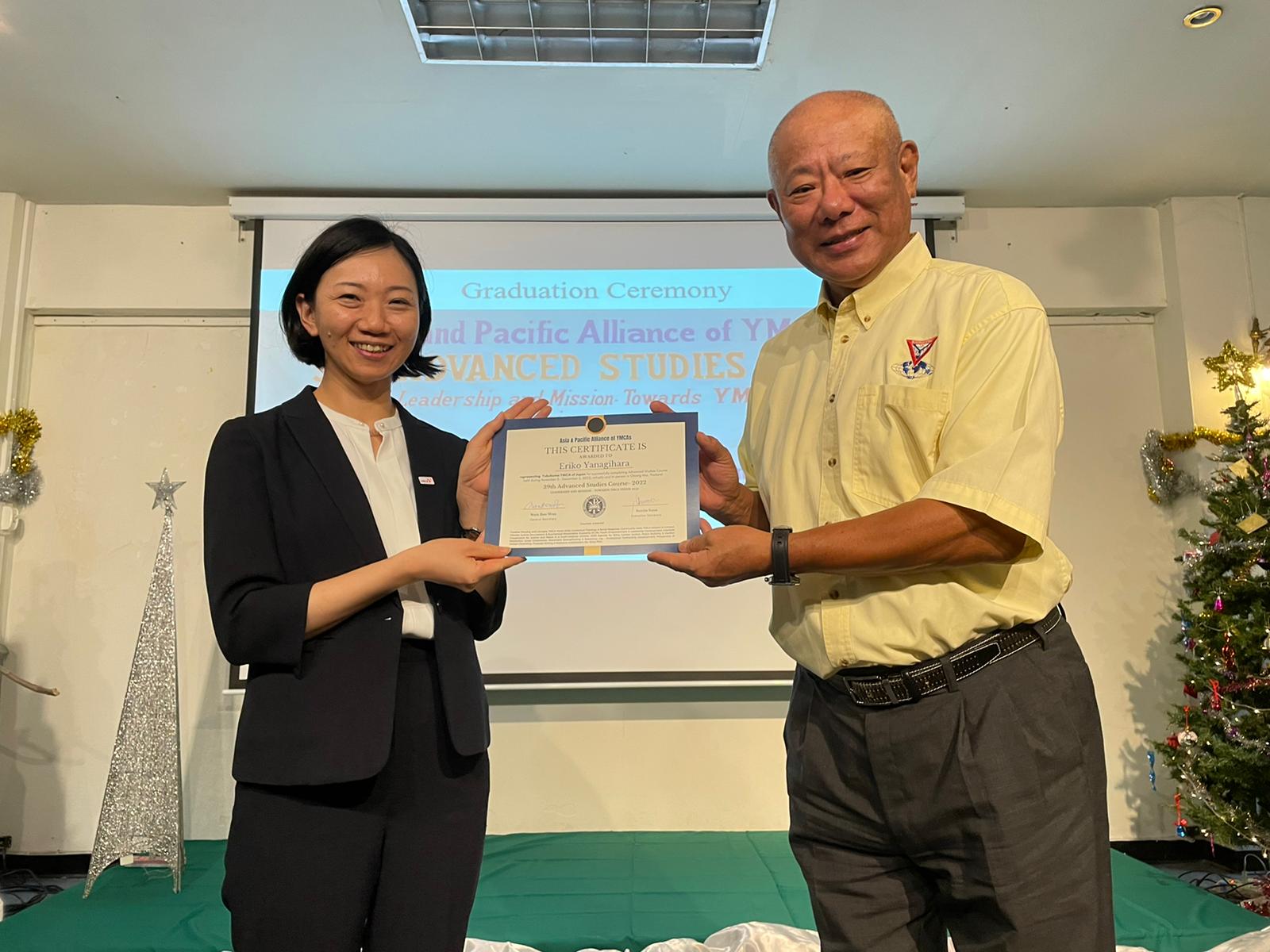
For the future
I learned the importance of never being satisfied with the status quo and always continuing to change for the better.
Remembering the lesson that the YMCA is an organization by youth and for youth and that the YMCA mission should be practised in a way that is in line with the region and the times, I would like to promote the YMCA movement in Japan and Yokohama.
I want to contribute to the YMCA's strength (strengthening the YMCA organization) by communicating how YMCA projects and activities rooted in the local community are connected to global social issues.
I will promote the YMCA movement in the global and local community services of the Yokohama YMCA, using the network established at ASC.
I will make it more important than ever to communicate the mission of the YMCA so that we can work in the same direction to promote Vision 2030 globally, in the Asia-Pacific region, in Japan, and Yokohama.
With gratitude
Finally, I would like to express my gratitude to the Yokohama YMCA and the National Council of YMCAs of Japan for sending me to participate in the ASC, to the laypersons and colleagues for their encouragement, and to my family for their support and endurance during the half month without their mother.
Also, a lot of appreciation to the APAY staff for preparing and arranging all the training and taking good care in its execution, as well as all those who provided sufficient knowledge and experience as resource persons.
I want to thank my fellow participants in the training with me for their patience, listening and trying to understand me despite my English communication difficulties. I thank God for allowing me to have such wonderful encounters and experiences.
By Eriko Yanagihara
Global & Local Community Services
Yokohama YMCA,
Participant of the 39th ASC
APAY Executive Committee Meeting 2023 held Virtually
Last Updated (Monday, 08 May 2023 14:50)
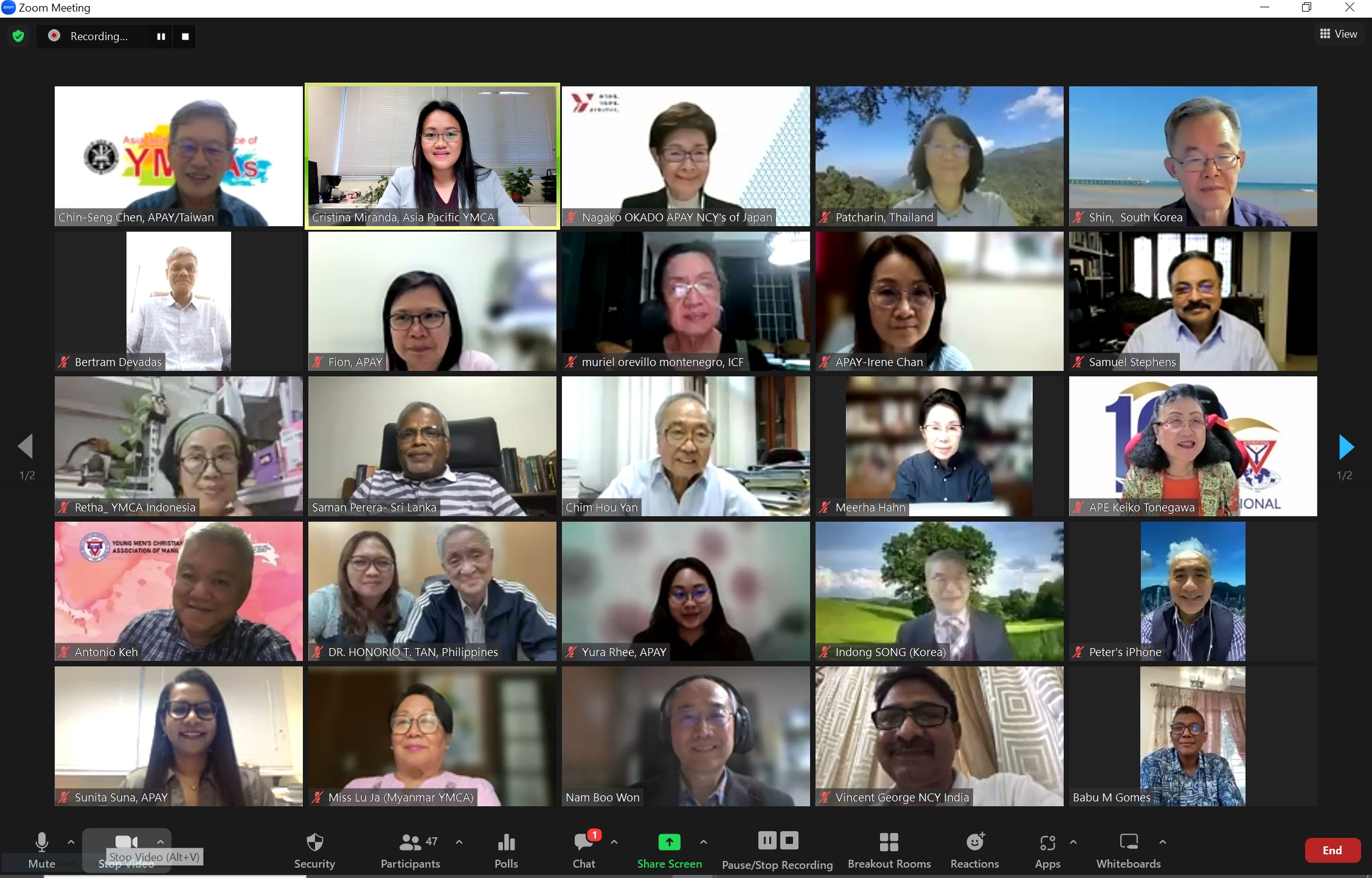 | 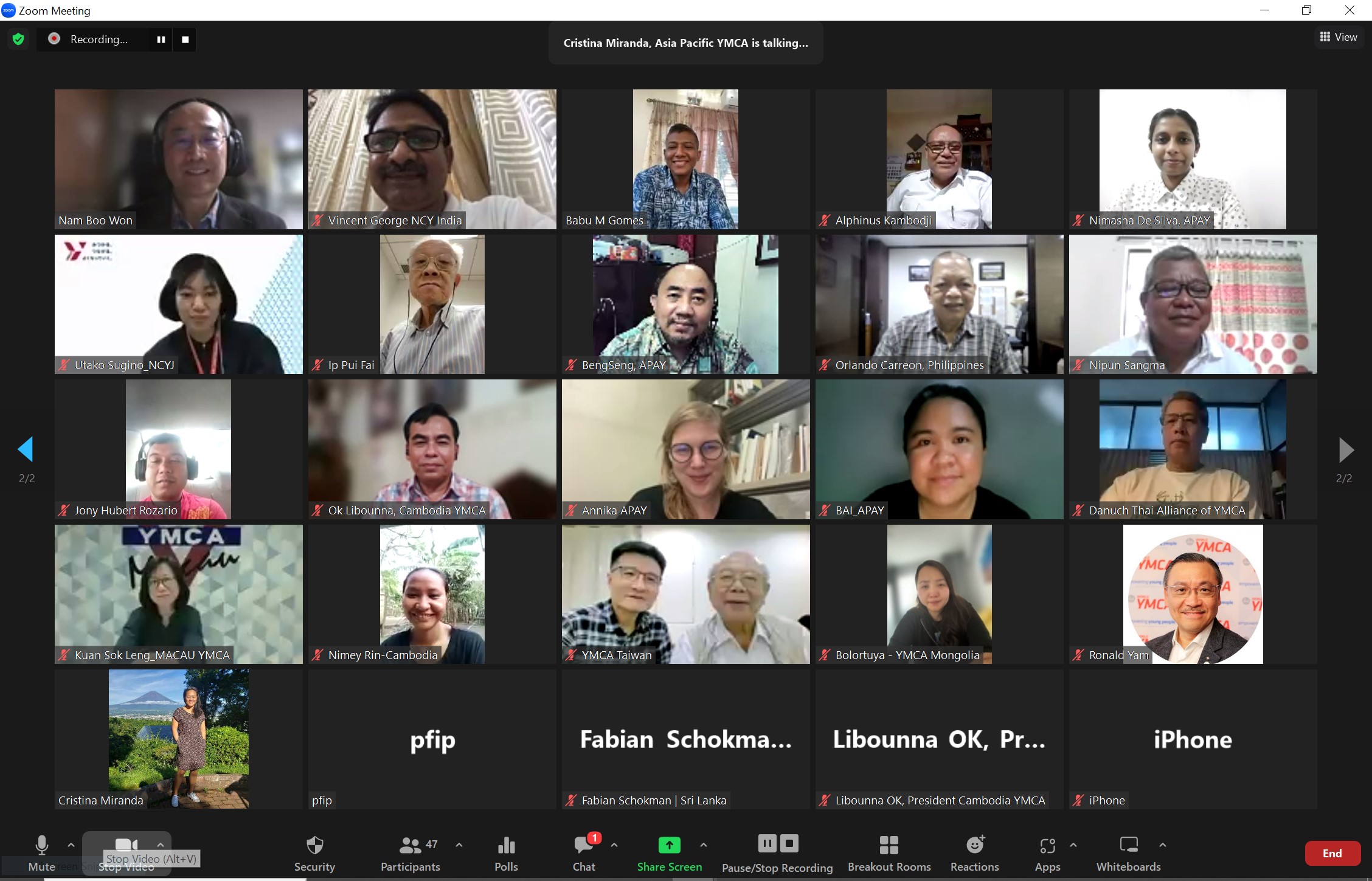 |
The APAY Executive Committee met virtually on the 14th of April from 3PM-6PM HKT. About 58 members including National YMCA Presidents, NGSs, APAY board members and other ex-officio Executive Committee members joined the ECM. The decision to hold the ECM in April, before the 21st General Assembly to be held in September 2023, was to provide more time allocation to the different components of the General Assembly in September including the Council Meeting.
The proposed agenda for the ECM was accepted and achieved during the meeting. The ECM received the following reports:
- General Secretary’s report: GS Nam Boo Won presented the 2022 annual report of APAY, sharing the important programs and activities of APAY with the members. Despite many challenges like COVID-19 global pandemic, the APAY staff team tried their best to achieve the proposed program plans for 2022.
- Audited Financial Report and Budget 2023
- Golden Anniversary Trust Fund Committee Report
- 21st GA Planning Committee Report: presented by the Chair Babu Gomes. The report highlighted the ongoing planning and preparations for the 21st General Assembly, scheduled from 15-20 September 2023, in Chennai, India. Before the 21st GA, there will be two pre-events: i.e. the 5th Youth Assembly and 1st Gender Equity Forum from 13-15 September 2023.
- Election Committee Report: presented by the Chair Nagako Okado
- Task Force Group Report on APAY Office Matters: presented by the Chair Rev. Samuel Stephens.
ECM also approved the 2023 Yearly Program Calendar of APAY.
The ECM made endorsement on the following Personnel Matters recommended by the APAY board. 1) appointment of two news APAY staff: Ms. Yura Rhee, Secretary for Admin and Youth Empowerment; Ms. Nimasha De Silva, Program Officer for Climate Defenders Project. 2) Ms. Cristina Miranda, Executive Secretary’s contract extended till 30 June 2023. 3) Mr. Nam Boo Won, General Secretary’s term is extended to August 2026.
The participants remembered the YMCA leaders who passed away in 2022. Vice President Honorio Tan presented the In Memoriam.
The ECM was concluded with closing remarks by president Chen Chin-Seng and a prayer led by board member Nagako Okado.
39th ASC Reflection
Last Updated (Thursday, 04 May 2023 16:10)
My learnings at the 39th ASC
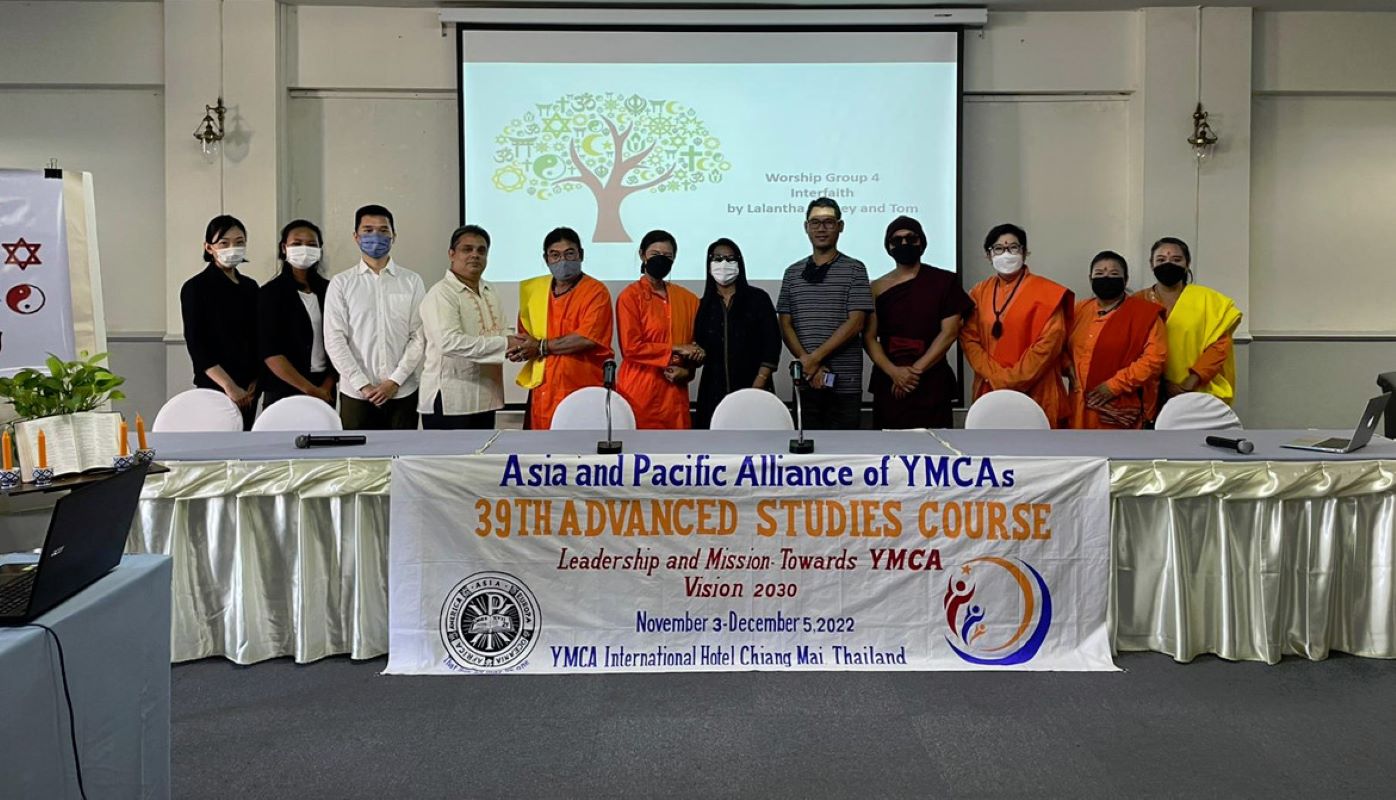
I wish to start my learnings in chronological order. Starting with sharing the life journey, which was an excellent exercise to go down memory lane after 40+ years. It gave me time to see how I have progressed and more over how GOD has blessed me to come so far with his grace.
Next was the session by Dr Rommel Linatoc on “Creative Worships & Liturgies”. A lot of insight was given. We were questioned, “Why do we attend a worship service?”. He clearly explained the process of organizing worship and LITURGY = Life in its fulness, Interconnection, Transformative of lives, Unity of purpose, Radiance of hope, GOD deliverance, Yearning resolutions. The altar formation was a very new thing that I learnt. Most importantly, I learnt how to create a “creative liturgy”, which will suit the context.
The next session was by Mr Nam on “Responding to GOD’s calling for Mission”. At the start, it was affirmed that we must seek GOD’s calling or plan rather than execute our plan. The Quadrennial Program Plan (QPP) was a new learning among the many new learnings and revision of known facts. We were also challenged to explore the DNA of the YMCA. Ecumenism & Ecumenical Movement by Ms Sunita was the next session. I learnt various aspects and different ecumenical organizations. This was a discussion-based session. However, I still doubt whether the YMCA is moving in the correct direction.
Next was a session by Mr Nam on “Movement Strengthening & Relevancy”. During this session, the three pillars of a healthy YMCA were discussed. A clear Vision & Mission, Relevant Work, and a Viable & Sustainable Foundation. It was also shared that if the Local YMCA Presidents are called for a similar session, they will get an insight into these, which will make an impact when it comes to change.
Following that was a session by Mr Razvan from the World Alliance on Vision 2030. An introduction was given on the new mandate; I learnt there is not much Christian emphasis, though it’s a passed mandate at the 20th World Council. Therefore, we need to think critically about certain aspects for the betterment of the movement at our own local YMCA level. I feel we should have allotted more time for this session.
The next session was “Agenda 2030 & SDGs” by Ms Denise KH Yoon. Again, it was quite an informative session and also refreshed my early learnings. I felt that more of our projects need to be re-aligned with the SDGs. We were also enlightened about the YMI, its evolution, and its mission towards the YMCA. Again, this left specific questions in mind and facts for pondering the fundamental mission of this institution and its future continuity.
The next session on “Good Governance” done by Dr Subash Masters” was one of the main topics that I was looking forward to. His teachings were very practical and contextual for the current-day practices of the YMCA. He emphasized the importance of following proper Constitutions and the need to be up to date to keep up with the current requirements. He also mentioned that governance has to be evaluated regularly.
Afterwards, we had a session on “Lay Professional Partnership (LPP)” by Mr Nam where the seven principles of LPP were taught. The next session was by Mrs Cristina & Mr Beng Seng on “Climate Justice for a Sustainable Planet”. There were many new learnings during the session. The session by Dr. George on “Economy of Life”, highlighted that he returned after the COP27, where the main sponsor was COCA-COLA, and that it is a significant contributor for environmental pollution. Now this gives a message across the world for us to ponder. He also enlightened us on the concept of Eco Capitalism. The main teaching was that we must solve the root cause rather than provide bandage solutions.
Though all of the above was on zoom, we learnt and shared a lot. It was a new experience to meet daily on zoom for 2 weeks. Finally, we all met in-person in Chiang Mai. It was another experience that we were longing to meet friends.
The first in-person session we had was on “Interfaith”. It was a great experience to see all the leaders of different faith sit together and discuss on common interests. The session by Dr Muriel also gave me lot of thinking. She highlighted that without properly having the Challenge 21 grasped by local YMCAs, it is now required that we start to think on Vision 2030.
We visited 3 community projects in Chiang Mai. The MAP foundation which was working for the migrant workers and their welfare, the HUG project which was setup to address many issues related to child abuse and trafficking, and the Urban Light which was addressing issues related to youth such as sexual abuse and matters of social concern. Many positives and negatives were shared during the discussion time. I would like to place on record, that it would have been better if this was more of a field exposure where we meet the communities and see how they are being handled. I expect this to be taken as constructive criticism for the next batches.
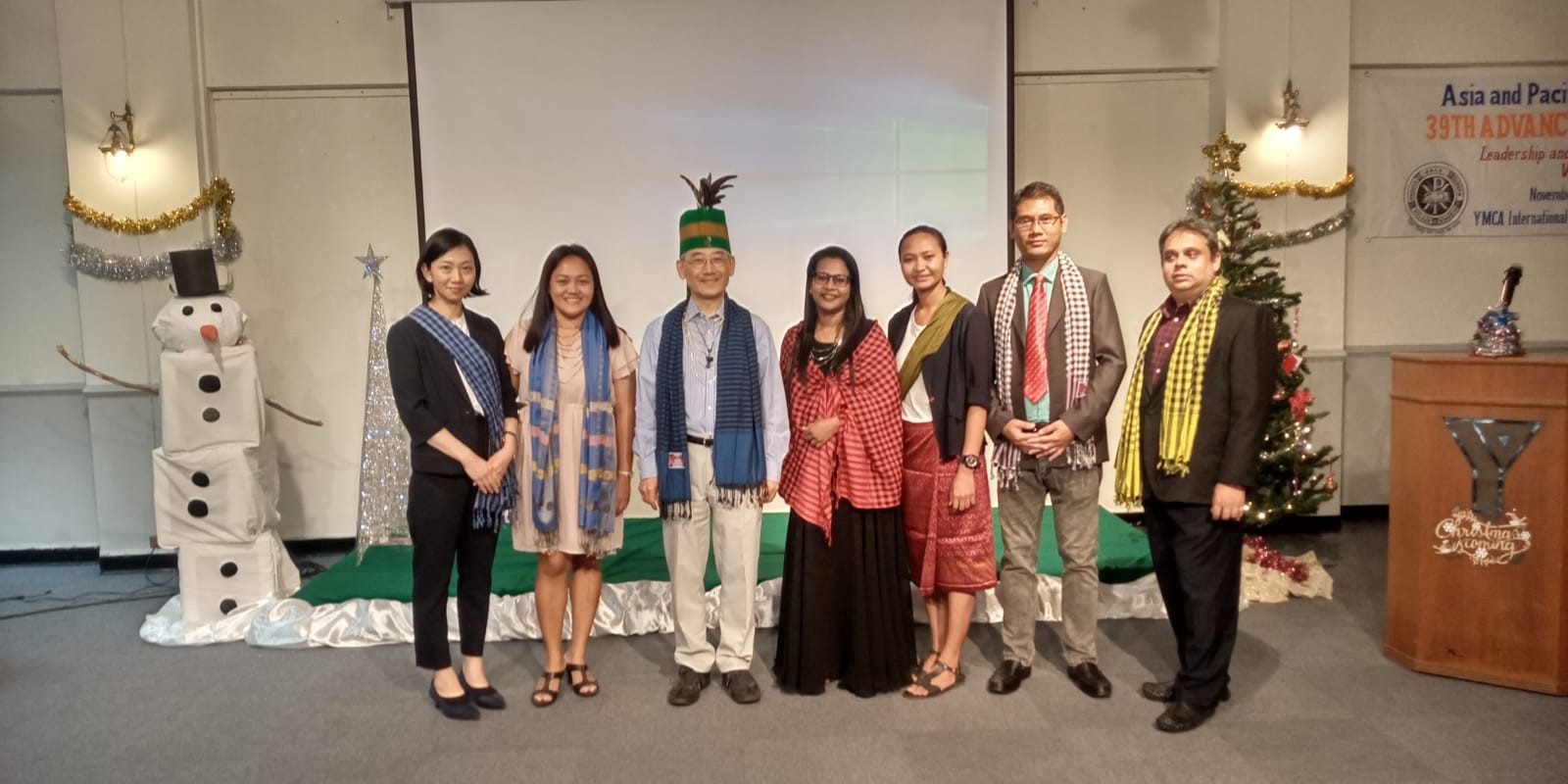
During the next session by Dr Rey Ty on “Peace Building and Conflict Resolution” it was taught that a good listener could be a point of peace making. The activity done practically proved the capability of listening. The next session on “APAYs Response to Gender Justice” by Sunita gave a lot of facts for thought. Simultaneously it left many questions or challenges for future leaders to ascertain the impact of being for or against the proposals. This being a highly debated topic in the current context, YMCA leaders also will have to be very mindful to think critically rather than just moving towards the trends.
The next session by Bishop Dr. Coorilos on “Contextual Theology”, discussed a new aspect of theology. The content was so intense that it made me want to read more. Our visit to the Sou Hin YMCA was a great exposure getting to know their practical implementations in response to the climate crisis. This visit was the most exciting and valuable during the study. I learnt many things that could be implemented from the learnings. The garbage separation and collection, re-using, power conservation, and use of solar are a few to note.
The one before the last session by Sunita on “Proposal Writing & Resource Mobilization” was useful to recap specific past learnings. Nam’s presentation on the “Strategic Planning Process” followed this, which was also very useful. The final session by Cristina was on “Youth Empowerment, Leadership & Development”. A very good discussion-based session where I could recap most of the theories learnt in the past.
Holistically the ASC has given me a certain level of insight and new learnings to develop my skills and abilities to function in my position.
I want to convey my heartfelt thanks to the Asia and Pacific Alliance of YMCAs (APAY), the NCYSL & the board of directors of Kandy YMCA, who allowed me to follow the Advanced Studies Course with much support and encouragement. I am also very grateful to all my new friends from different parts of Asia and the Pacific region for all the support during the study.
Lalantha Jayasinghe
General Secretary – Kandy YMCA (Sri Lanka)
39th ASC participant
A Brief Reflection of the 39th Advanced Studies Course (ASC)
Last Updated (Monday, 03 April 2023 13:02)
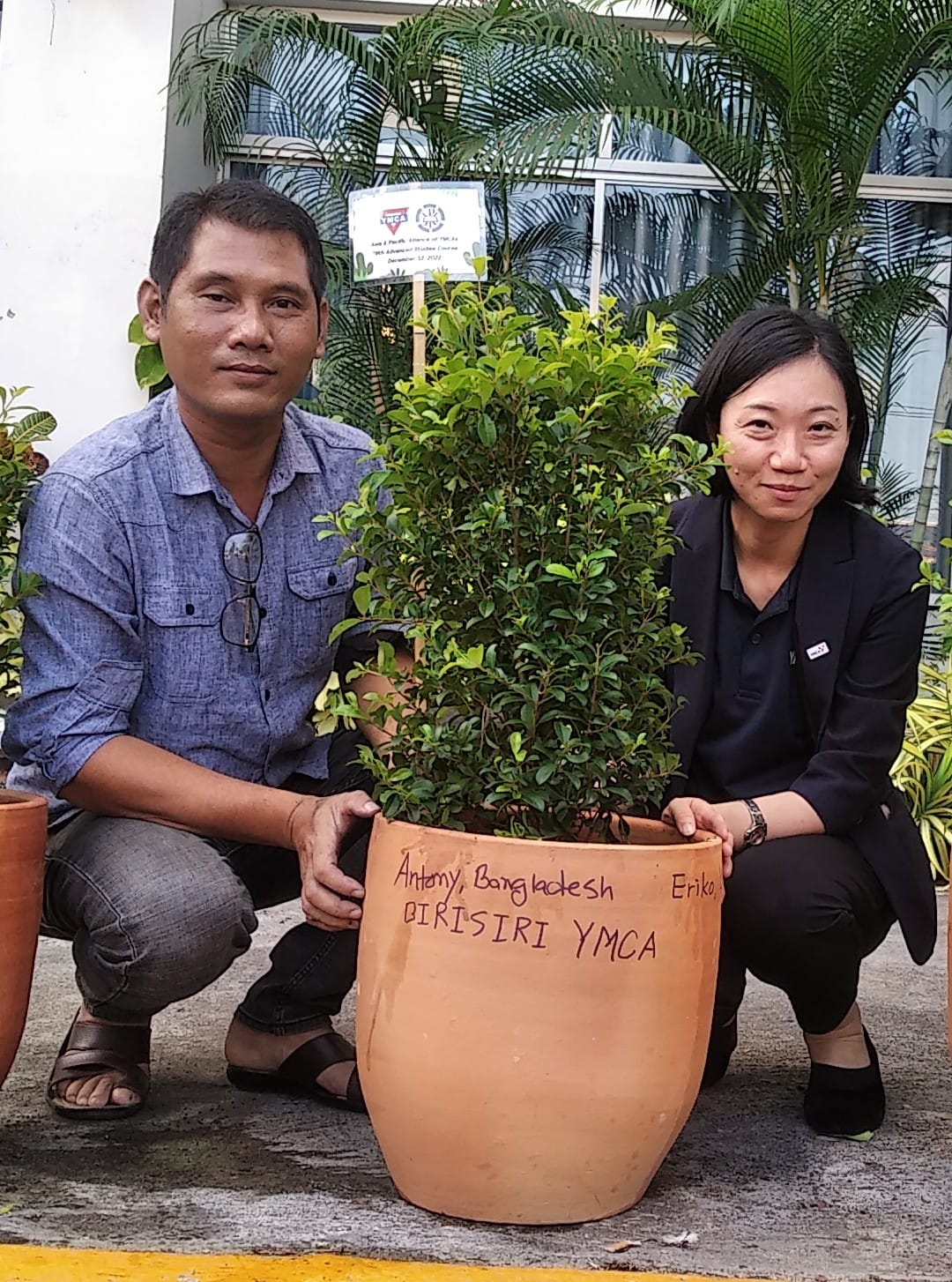 The 39th Advanced Studies Course was one of the most significant experiences of my life. I Joined having many expectations of learning through the course, and I did.
The 39th Advanced Studies Course was one of the most significant experiences of my life. I Joined having many expectations of learning through the course, and I did.
The sessions on Creative Worship & Liturgies brought many new insights. Earlier, I believed it was mandatory to follow specific rules to worship, but the sessions helped to understand why we worship and how to make it meaningful and creative as we worship together. We usually worship within our comfort zone, which needs to break with new perspectives and broaden our understanding to eliminate doubts and fears and travel from known to unknown. Learning should be an ongoing process, and I learned many new things from this course.
Before joining the ASC, I was unfamiliar with the terms Ecumenism and Ecumenical Movements. The session on this topic helped me to accept that YMCA is an ecumenical organization. In today’s context, Ecumenism is very much needed, especially in our churches, society, and religious communities, as we witness many conflicts due to our differences. We need to strengthen the ecumenism & ecumenical movement. We are all called to be part of the ecumenical boat despite our differences and be united, and I believe our YMCA movements can do it with its dynamism.
Movement Strengthening and Relevancy was other important subject for me to learn. I learned that for an organization to be strong, it must have a clear mission and vision. The three pillars talked about 1) Mission Clarity, 2) Social Relevance 3) Institutional Viability (governance and membership). And their work should be relevant to youth and society. A viable and sustainable foundation is crucial for an organization. Every YMCA should have a strong membership recruitment process for young people and create opportunities to become leaders. Our programs should reflect the Challenge 21 and be committed to the Vision 2030 goals. Establishing good governance is another priority for all the YMCAs. We should work in a way that makes us efficient and Able to meet the needs of youth and the community.
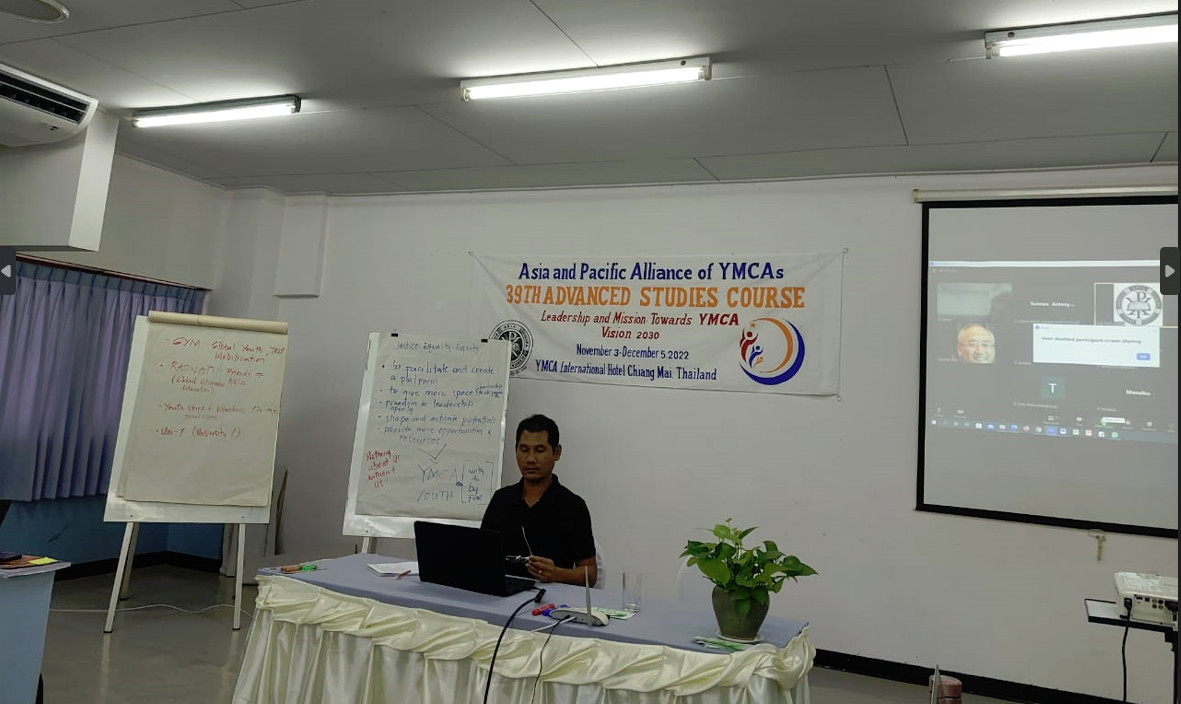
I learned about many more important things, and the visits to three issue-based organizations and communities were meaningful. They are (1) MAP Foundation (MAPs mission is to empower migrant workers in Burma and their communities to take action to claim their rights), (2) Hug Project (The HUG Project Thailand is preventing, protecting, and restoring children from sexual abuse and human trafficking) and (3) Urban Light (Urban Light work to protect boys and men by meeting their basic needs and EMPOWER them through education). We visited The Sao Hin YMCA. Sao Hin YMCA is working to respond to Global Warming and developing alternatives to use environmentally friendly energy. I am impressed and inspired to see the Sao Hin YMCAs Green initiatives.
It was also a learning space to experience diversity by studying with friends from other countries. I would like to thank the facilitators and mentors who taught us various subjects for a month and all my classmates and friends who have helped me in various ways, and we had a great time together.
I express my special thanks to Birisiri YMCA, NCY of Bangladesh, and gratitude to APAY for giving me the opportunity to do this course, especially Mr. Nam Boo Won - General Secretary of Asia Pacific Alliance of YMCAs, to Ms Sunita Suna, executive secretary of APAY. This course has certainly brought me a vast experience to apply in my work at YMCA.
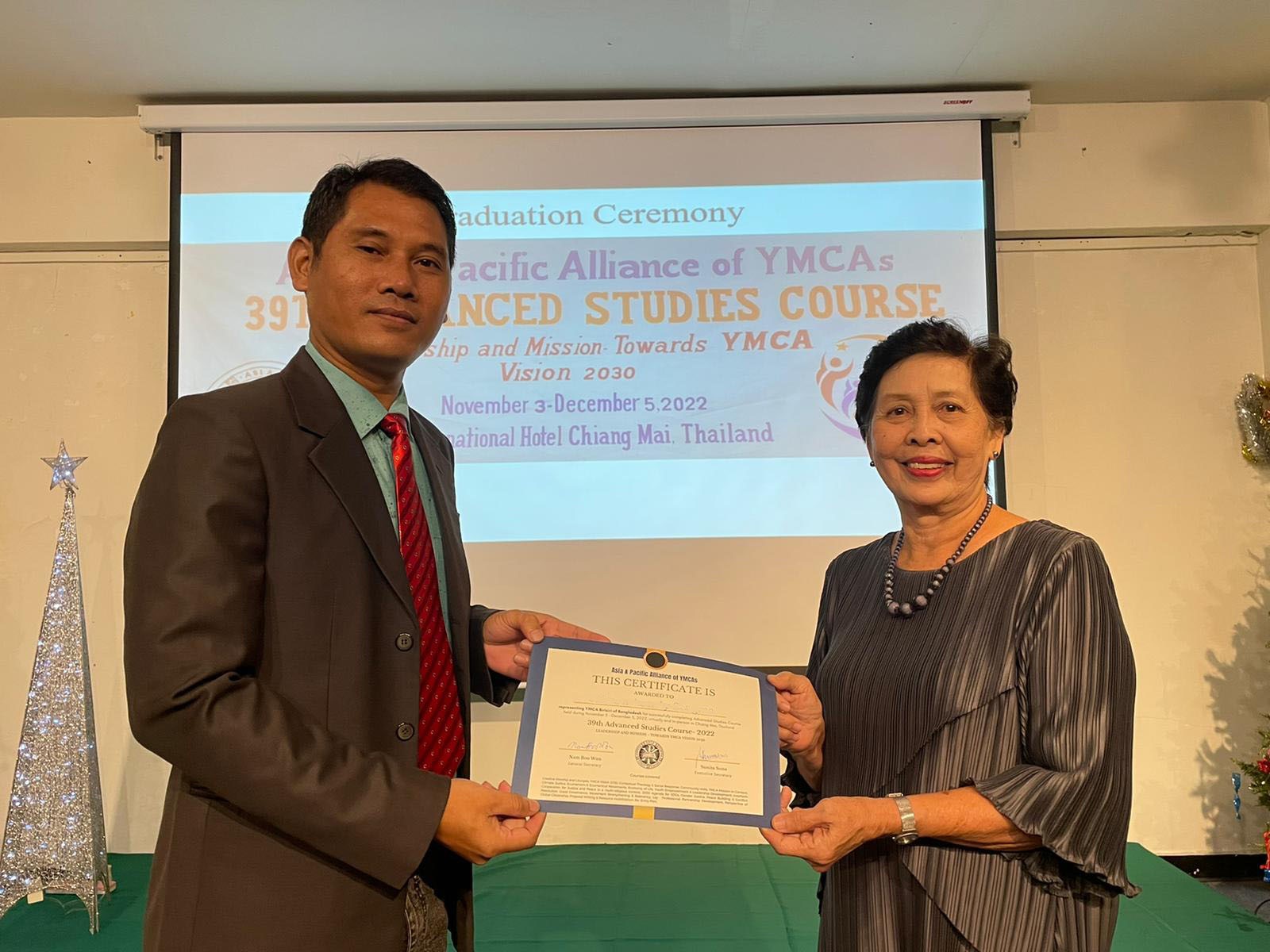 | 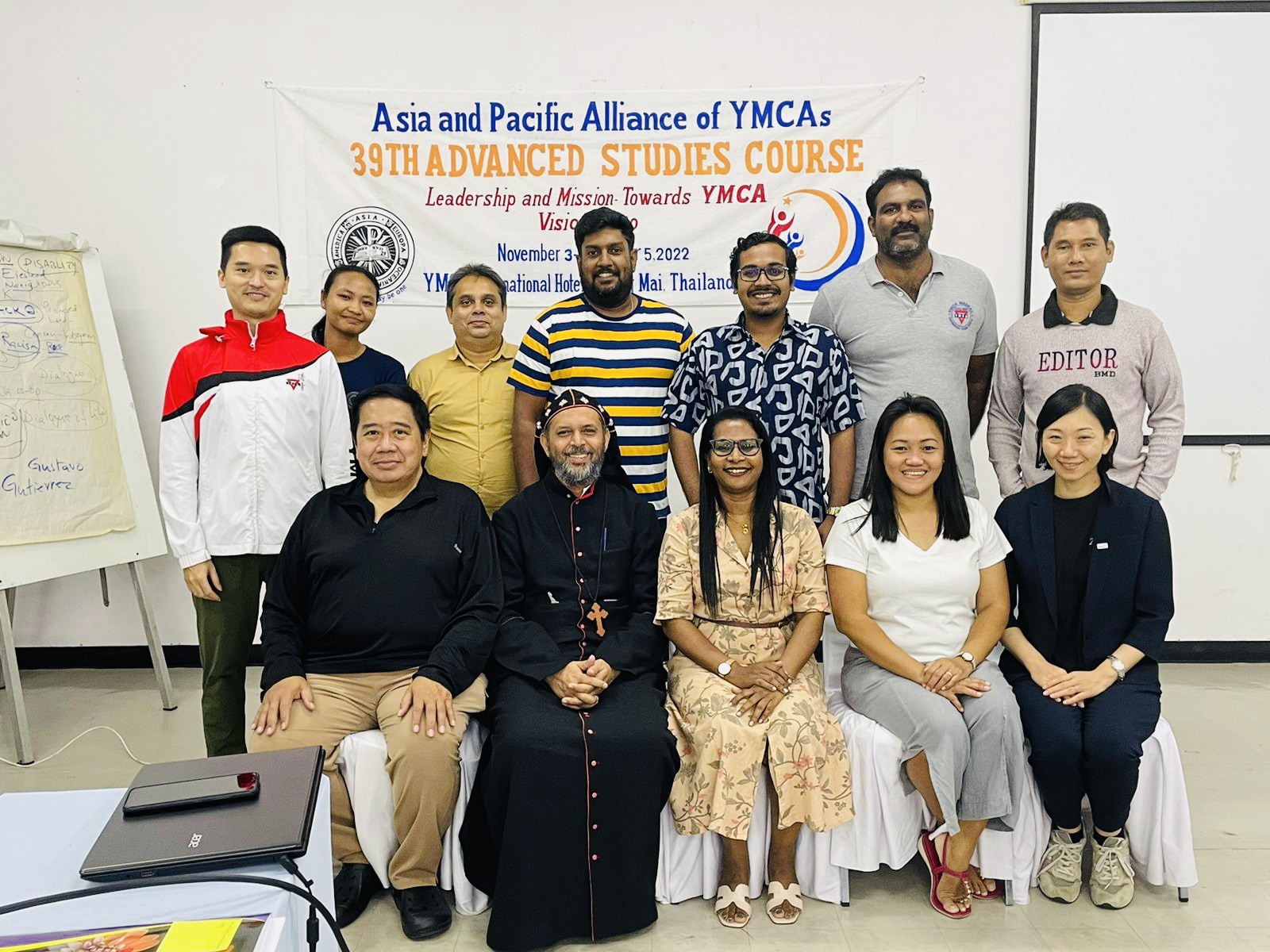 |
The 39th ASC was divided into two parts: the online course was organized from November 3 – 18, 2022 and November 20 - December 5, 2022 in person Chiang Mai, Thailand.
by Saimon Antony Sangma
General Secretary, Birisiri YMCA, Bangladesh.
39th ASC Participant.
A Reflection of the 39th Advanced Studies Course ASC
Last Updated (Friday, 03 March 2023 16:00)
Looking back to our 10 years journey with YMCA is a blessing and opportunity for us to grow and be equipped individually and collectively to continue our mission as we are called to be the salt and light of the world to ignite the change!
One of these opportunities was the ASC program. I was privileged to attend the 39th Advanced Studies program organized by the Asia Pacific Alliance of YMCAs(APAY) with the theme “Leadership and Mission – Towards YMCA Vision 2030”.
This course was designed for the executive staff of the national movement. However, attending as a National President was an honour and an excellent opportunity to re-ignite and get re-fueled to strengthen our national YMCA in the best possible ways.
The 39th ASC was a huge learning space for me with a virtual experience. I gained deep insights and understanding about the Mission and Vision of the YMCA and explored more about Ecumenism & Ecumenical Movements; Movement Strengthening & Relevancy; Good Governance; Interfaith cooperation for justice and peace in a multi-religious context; Gender Justice; Climate Change; YMCA Vision 2030; Economy of Life; SDG, contextual theology; youth leadership and more with the help of our professional leaders and classmates of YMCAs.
Highlights of the Advanced Studies Course for us were as participants from diverse YMCAs to explore and develop a comprehensive understanding of the common challenges facing the Asia Pacific Region while also being equipped to seek and implement solutions through the YMCA. All these gave us a great challenge on how we as a movement need to respond to these in our unique context.
What stood out to me the most was the root “Why” aka the Paris Basis that acknowledges that we are a global organization based on Christian values and the matter of how we can contextualize and live our core values and demonstrate the DNA of our YMCA identity into practice in tangible ways to help the Spirit, Mind and Body.
I’m incredibly thankful to see that APAY is doing more and working to include women and girls at all levels of the YMCA, recognizing that Challenge 21 intended to include all young people, irrespective of gender, to ensure that gender equality in our communities is achieved with the active participation of the YMCA.
I reckon this course was super helpful in boosting the recharger that I really needed at the point in time for me to work on the challenges and conflicts of the existing form of the YMCA and leaders for the strengthening and growth of our national YMCA.
The program ended with a re-entry plan made by each participant related to the knowledge and understandings from sessions and perspectives given during the Studies and further proposals for movement strengthening; it helped me to see the bigger picture and inspired me to get on with it.
I genuinely feel that this was a great empowering event, with lots of “How-s”, as YMCA professionals, we have to be aware of those basics, to understand the context we are living in for creating meaningful programs that address to those realities and fulfill needs and most importantly, to develop and offer impactful programs to our communities.
I realised that we need to be supported by a strong and self-sufficient institution based on good governance, principles, and values to continue the Movement strengthening.
I want to express my deep gratitude to APAY fellow members, for all their trust, support and empowerment given to me during these years, especially for appointing me to attend this Program.
My great appreciation goes to Mr. Nam Boo Won - General Secretary of Asia Pacific Alliance of YMCAs, to Ms Sunita Suna, executive secretary of APAY, Ms. Cristina Miranda, executive secretary of APAY, to all APAY staff, for offering this excellent learning opportunity, for all the valuable knowledge , support, care and encouragement given to me.
I am particularly grateful to my classmates and fellow YMCA friends for all the sharing, inclusiveness, care, friendship and cooperation built during this 39th Advanced Studies Program.
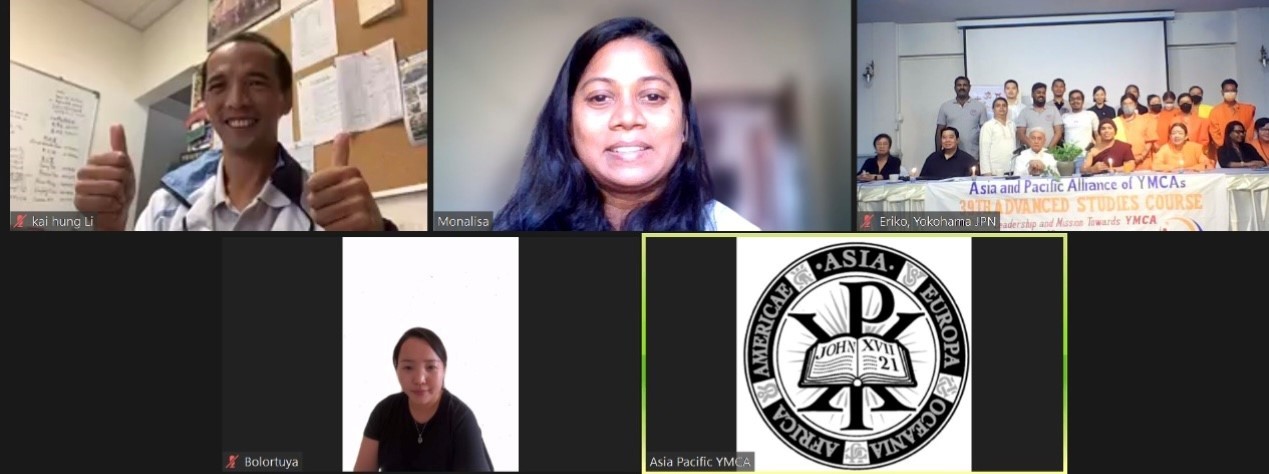
By Bolortuya Dondovsambuu
National President, YMCA Mongolia
Online participant of the 39th ASC
Read more...
Page 4 of 16





